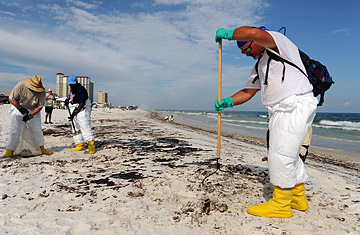
Crews work to clean up the oil spill at Pensacola Beach in Florida
For weeks, the residents of Florida's northwest Panhandle had clung to a belief that the BP oil spill devastating the coasts of Louisiana, Mississippi and Alabama would bypass their famous ivory-white beaches. Until now, it had: despite an intermittent spitting of tar balls and the encroachment of a thin petro-sheen on the horizon, charitable winds and currents kept the real mess from washing ashore and threatening the Panhandle's critical summer season — as well as Florida's $60 billion tourism industry.
But the Sunshine State's luck turned to muck this week when a mat of oil, weathered but still thicker than a sheen, began to blanket popular Pensacola Beach, prompting Florida's first spill-related beach closures. Thursday evening, saucer-size crude patties and large oil puddles still pockmarked the sand up and down the shore. The area beaches reopened Friday morning after the filth was adequately cleared, but the psychological as well as physical damage was done. "As long as the wind was keeping it away offshore, there was a sense of optimism," says Meg Peltier, head of the Gulf Breeze, Fla., Chamber of Commerce (and no relation to this story's author). "But when it finally came ashore, it took the wind out of a lot of people's sails."
The truth is that the Panhandle's sails were already drooping. Mere fear of the spill had cut deeply into the area's tourist bookings, 90% of which are usually made for the summer months. The bumper-to-bumper traffic which this time of year normally clogs Pensacola Beach's Via de Luna, a tourist Mecca, is uncharacteristically manageable. But the damage to the tourism industry could be worse — parking lots at hotels and attraction sites still look half full. Charter boat operators and commercial fishermen are seeing their livelihoods utterly idled by the oil spewing 5,000 feet below the Gulf of Mexico's surface more than 100 miles away off the Louisiana coast.
Further inland, where many of the workers who clean the rooms, pump the gas and wait the tables this time of year reside, food stamp allocations are up almost 20% in just the past 60 days. So is unemployment in the region, which is now higher than the statewide rate of almost 12%. State social services officials are talking about an increase in domestic abuse, child neglect and other economy-related ills. "These people are scared, they're worried, they're frustrated," says Phil Wieczynski, a Florida environmental official who visited with some 400 residents in nearby Port St. Joe this week. "They see what's going on, and we need to do whatever we can to assure them that steps are going to be taken to address issues and protect their way of life."
The good news is that the gunk that reached Pensacola this week seems to have gone back out to sea. But while Florida Governor Charlie Crist was again out on the beaches Friday morning, urging the Obama Administration and BP to provide Florida with more oil-skimmer vessels than the 20 sent there so far, locals sounded increasingly cynical. Most say they see a lack of resolve from BP and federal responders overseeing a Dilbert-like command structure as Byzantine as it is ineffective. Jeff Taggart, owner of a Pensacola Beach marina, has lost $40,000 in business, not including the $25,000 he paid for fuel in anticipation of the summer tourist rush. BP assured him he'd be reimbursed, but so far he's seen only $10,000 from his claims — and he says he stands to lose much more before Labor Day. "I am, right now, financing BP's clean-up efforts," he says.
Along with the normal summer activities, like concerts and art shows, local business leaders are also promoting the appearance next week of a psychologist who treated Alaskans after the 1989 Exxon Valdez oil spill. His topic: how to handle the stress brought on by weeks and weeks of relentless anxiety. Noting the news this week of an Alabama commercial fisherman's apparent suicide, Peltier wonders how long it will be before such tragedies occur on the Panhandle. People are "tired," she says, even too tired to be angry anymore, and that worries her more. "It's not just livelihoods but a way of life that's at stake here," she says. "The whole reason why many of us are here is being brought into question." What's no longer in question is whether Florida can be as darkened by this spill as the rest of the Gulf has been.
